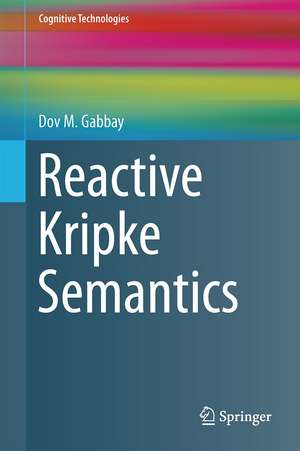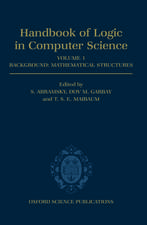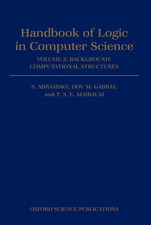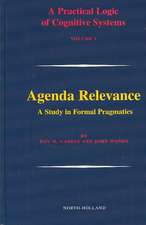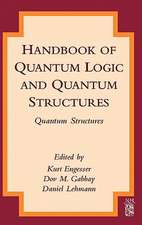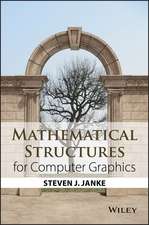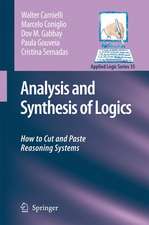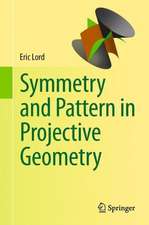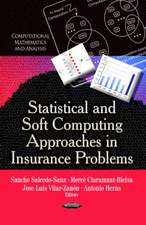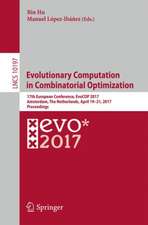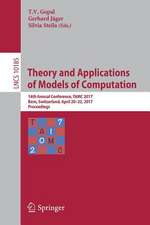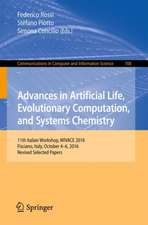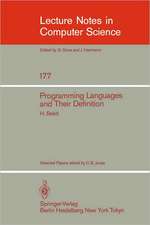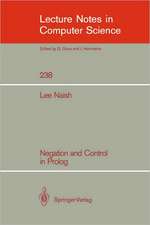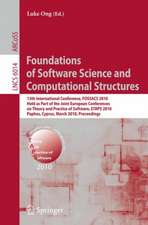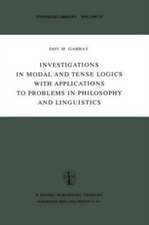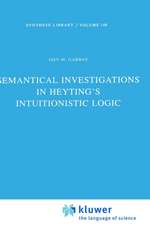Reactive Kripke Semantics: Cognitive Technologies
Autor Dov M. Gabbayen Limba Engleză Hardback – 16 dec 2013
Reactive Kripke semantics is the next step in the evolution of possible world semantics for non-classical logics, and this book, written by one of the leading authorities in the field, is essential reading for graduate students and researchers in applied logic, and it offers many research opportunities forPhD students.
| Toate formatele și edițiile | Preț | Express |
|---|---|---|
| Paperback (1) | 653.38 lei 6-8 săpt. | |
| Springer Berlin, Heidelberg – 23 aug 2016 | 653.38 lei 6-8 săpt. | |
| Hardback (1) | 621.37 lei 38-45 zile | |
| Springer Berlin, Heidelberg – 16 dec 2013 | 621.37 lei 38-45 zile |
Din seria Cognitive Technologies
- 20%
 Preț: 350.99 lei
Preț: 350.99 lei - 15%
 Preț: 649.71 lei
Preț: 649.71 lei - 20%
 Preț: 336.21 lei
Preț: 336.21 lei - 15%
 Preț: 635.47 lei
Preț: 635.47 lei - 20%
 Preț: 650.73 lei
Preț: 650.73 lei - 20%
 Preț: 644.15 lei
Preț: 644.15 lei - 20%
 Preț: 886.16 lei
Preț: 886.16 lei - 20%
 Preț: 331.91 lei
Preț: 331.91 lei -
 Preț: 390.63 lei
Preț: 390.63 lei - 20%
 Preț: 337.13 lei
Preț: 337.13 lei - 20%
 Preț: 1458.56 lei
Preț: 1458.56 lei - 20%
 Preț: 646.80 lei
Preț: 646.80 lei - 20%
 Preț: 994.08 lei
Preț: 994.08 lei - 20%
 Preț: 649.09 lei
Preț: 649.09 lei -
 Preț: 397.38 lei
Preț: 397.38 lei - 20%
 Preț: 988.00 lei
Preț: 988.00 lei - 20%
 Preț: 1009.61 lei
Preț: 1009.61 lei - 20%
 Preț: 597.18 lei
Preț: 597.18 lei - 20%
 Preț: 614.19 lei
Preț: 614.19 lei - 20%
 Preț: 675.51 lei
Preț: 675.51 lei - 20%
 Preț: 994.40 lei
Preț: 994.40 lei - 20%
 Preț: 891.89 lei
Preț: 891.89 lei - 20%
 Preț: 600.41 lei
Preț: 600.41 lei - 20%
 Preț: 533.76 lei
Preț: 533.76 lei - 20%
 Preț: 647.61 lei
Preț: 647.61 lei - 20%
 Preț: 645.14 lei
Preț: 645.14 lei - 20%
 Preț: 512.39 lei
Preț: 512.39 lei - 20%
 Preț: 338.68 lei
Preț: 338.68 lei - 20%
 Preț: 345.22 lei
Preț: 345.22 lei - 20%
 Preț: 668.55 lei
Preț: 668.55 lei -
 Preț: 365.21 lei
Preț: 365.21 lei - 20%
 Preț: 640.51 lei
Preț: 640.51 lei - 20%
 Preț: 1297.17 lei
Preț: 1297.17 lei
Preț: 621.37 lei
Preț vechi: 776.71 lei
-20% Nou
Puncte Express: 932
Preț estimativ în valută:
118.90€ • 127.14$ • 99.14£
118.90€ • 127.14$ • 99.14£
Carte tipărită la comandă
Livrare economică 14-21 aprilie
Preluare comenzi: 021 569.72.76
Specificații
ISBN-13: 9783642413889
ISBN-10: 3642413889
Pagini: 456
Ilustrații: XII, 442 p. 201 illus., 10 illus. in color.
Dimensiuni: 155 x 235 x 30 mm
Greutate: 0.81 kg
Ediția:2013
Editura: Springer Berlin, Heidelberg
Colecția Springer
Seria Cognitive Technologies
Locul publicării:Berlin, Heidelberg, Germany
ISBN-10: 3642413889
Pagini: 456
Ilustrații: XII, 442 p. 201 illus., 10 illus. in color.
Dimensiuni: 155 x 235 x 30 mm
Greutate: 0.81 kg
Ediția:2013
Editura: Springer Berlin, Heidelberg
Colecția Springer
Seria Cognitive Technologies
Locul publicării:Berlin, Heidelberg, Germany
Public țintă
ResearchCuprins
Chap.1 - A Theory of Hypermodal Logics.- Chap.2 - Introducing Reactive Kripke Semantics and Arc Accessibility.- Chap.3 - Introducing Reactive Modal Tableaux.- Chap.4 - Reactive Intuitionistic Tableaux.- Chap.5 - Completeness Theorems for Reactive Modal Logics.- Chap.6 - Modal Logics of Reactive Frames.- Chap.7 - Global View on Reactivity: Switch Graphs and their Logics.- Chap.8 - Reactive Automata.- Chap.9 - Reactivity and Grammars: An Exploration.- Chap.10 - Reactive Flow Products.- Chap.11 - Reactive Standard Deontic Logic.- Chap.12 - Reactive Preferential Structures and Nonmonotonic Consequence.- References.- Index.
Recenzii
“This book is devoted to a new and so far little explored research topic, developed mostly by the author since the early 2000s. … this book is rich with ideas and interesting in various ways. It is written in the distinct Gabbay’s trademark style. It can surely serve as a rich source of inspiration and research ideas … .” (Valentin Goranko, Studia Logica, Vol. 105, 2017)
Notă biografică
The author is one of the foremost authorities on nonclassical logics and their applications in computing.
Textul de pe ultima copertă
This text offers an extension to the traditional Kripke semantics for non-classical logics by adding the notion of reactivity. Reactive Kripke models change their accessibility relation as we progress in the evaluation process of formulas in the model. This feature makes the reactive Kripke semantics strictly stronger and more applicable than the traditional one. Here we investigate the properties and axiomatisations of this new and most effective semantics, and we offer a wide landscape of applications of the idea of reactivity. Applied topics include reactive automata, reactive grammars, reactive products, reactive deontic logic and reactive preferential structures.
Reactive Kripke semantics is the next step in the evolution of possible world semantics for non-classical logics, and this book, written by one of the leading authorities in the field, is essential reading for graduate students and researchers in applied logic, and it offers many research opportunities forPhD students.
Reactive Kripke semantics is the next step in the evolution of possible world semantics for non-classical logics, and this book, written by one of the leading authorities in the field, is essential reading for graduate students and researchers in applied logic, and it offers many research opportunities forPhD students.
Caracteristici
First consolidated monograph on reactive Kripke semantics Suitable for researchers in mathematical logic First presents detailed theory of reactive Kripke semantics then applications in a variety of areas
